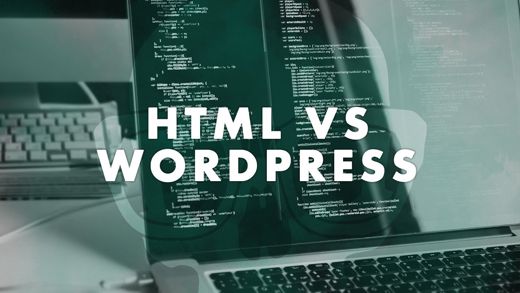Which Is Better For SEO HTML Or WordPress?
There are certain comparisons that are made where the evidence provided by data, does not match what the majority of those with an opinion will tell you. A classic example is when people ask whether HTML or WordPress is better for SEO. Let us say from the outset that most of the empirical data and statistics indicate that neither HTML nor WordPress has an advantage over the other when it comes to SEO.
Now we must clarify what we mean by an advantage. What we are talking about here is whether sites built using WordPress, for example, will rank higher than a site built with HTML, when all other factors are equal. The fact of the matter is that Google doesn’t place any great emphasis on what a website is built from when it comes to ranking them.
To confirm this, do a random search on Google and click through to each of the top ten websites. For each one, if you then press CTRL+U on your keyboard the source code will appear. Using the find function in your browser type in ‘wp-content’. If the search finds that in the code it is a WordPress site, and if not then it could be either a HTML site or one built using another less popular Content Management System (CMS).
While the data tells us there is no ranking advantage with either HTML or WordPress per se, that does not mean that neither of them offers advantages and disadvantages when it comes to implementing SEO strategies. When you are trying to optimise your website for the search engines there are differences between HTML and WordPress in terms of how they function, and how easy or not they make the task of SEO.
With HTML, there is no underlying code which you must concern yourself with, which is not the case with WordPress and the plugins you might use with it. Clean static HTML is effectively ‘set it and forget it’ whereas with WordPress you must constantly be aware of updates, and if any of them have any compatibility issues. If this happens to break your website and it is not noticed for some time, Google may crawl your website in the mean-time and your ranking may/will suffer.
Although there are many customisation options with WordPress, they can be limited in some respect, whereas with HTML your options are virtually unlimited. This means you have absolute control over every aspect and website function – and therefore can do whatever you like code-wise in order to boost the SEO of your website.
But it is not all good news for HTML. Unless you are a skilled and experienced coder, the cost of you hiring one to create this website, and customise it for SEO purposes, as we’ve described, can be high. Also, the time it can take to build and optimise a HTML website compared to doing it on WordPress is much greater. For instance HTML websites generally are made up of individual html pages which all need to be edited individually. Whilst this allows for better code and page customisation, it takes a lot longer to edit than a site built with site-wide headers and footers etc.
Another advantage WordPress has over HTML is the many plugins which have been created to increase and expand the functionality of websites that use it. This includes many of the actions you will want to take in relation to optimising content, pages and many other parts of your site for SEO. This means that all your on-page bases can be fully covered on WordPress, in much less time, and for a lot less money than it would using HTML.
For these reasons, while WordPress offers no advantage in terms of ranking on Google as such, the speed and ease with which it can help you do everything needed to boost those rankings, give it a definite edge over HTML.

